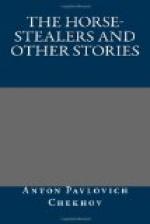“I am a vegetarian. Killing animals is against my principles.”
Zhmuhin thought a minute and then said slowly with a sigh:
“Yes . . . to be sure. . . . I saw a man who did not eat meat in town, too. It’s a new religion they’ve got now. Well, it’s good. We can’t go on always shooting and slaughtering, you know; we must give it up some day and leave even the beasts in peace. It’s a sin to kill, it’s a sin, there is no denying it. Sometimes one kills a hare and wounds him in the leg, and he cries like a child. . . . So it must hurt him!”
“Of course it hurts him; animals suffer just like human beings.”
“That’s true,” Zhmuhin assented. “I understand that very well,” he went on, musing, “only there is this one thing I don’t understand: suppose, you know, everyone gave up eating meat, what would become of the domestic animals—fowls and geese, for instance?”
“Fowls and geese would live in freedom like wild birds.”
“Now I understand. To be sure, crows and jackdaws get on all right without us. Yes. . . . Fowls and geese and hares and sheep, all will live in freedom, rejoicing, you know, and praising God; and they will not fear us, peace and concord will come. Only there is one thing, you know, I can’t understand,” Zhmuhin went on, glancing at the ham. “How will it be with the pigs? What is to be done with them?”
“They will be like all the rest—that is, they will live in freedom.”
“Ah! Yes. But allow me to say, if they were not slaughtered they would multiply, you know, and then good-bye to the kitchen-gardens and the meadows. Why, a pig, if you let it free and don’t look after it, will ruin everything in a day. A pig is a pig, and it is not for nothing it is called a pig. . . .”
They finished supper. Zhmuhin got up from the table and for a long while walked up and down the room, talking and talking. . . . He was fond of talking of something important or serious and was fond of meditating, and in his old age he had a longing to reach some haven, to be reassured, that he might not be so frightened of dying. He had a longing for meekness, spiritual calm, and confidence in himself, such as this guest of theirs had, who had satisfied his hunger on cucumbers and bread, and believed that doing so made him more perfect; he was sitting on a chest, plump and healthy, keeping silent and patiently enduring his boredom, and in the dusk when one glanced at him from the entry he looked like a big round stone which one could not move from its place. If a man has something to lay hold of in life he is all right.
Zhmuhin went through the entry to the porch, and then he could be heard sighing and saying reflectively to himself: “Yes. . . . To be sure. . . . By now it was dark, and here and there stars could be seen in the sky. They had not yet lighted up indoors. Someone came into the parlour as noiselessly as a shadow and stood still near the door. It was Lyubov Osipovna, Zhmuhin’s wife.




